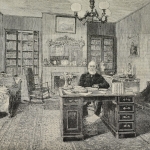I write my name as one,
On sands by waves o’errun
Or winter’s frosted pane,
Traces a record vain.
Oblivion’s blankness claims
Wiser and better names,
And well my own may pass
As from the strand or glass.
Wash on, O waves of time!
Melt, noons, the frosty rime!
Welcome the shadow vast,
The silence that shall last!
When I and all who know
And love me vanish so,
What harm to them or me
If any words of mine,
Through right of life divine,
Remain, what matters it
Whose hand the message writ?
Why should the “crowner’s quest”
Sit on my worst or best?
Why should the showman claim
The poor ghost of my name?
Yet, as when dies a sound
Its spectre lingers round,
Haply my spent life will
Leave some faint echo still.
A whisper giving breath
Of praise or blame to death,
Soothing or saddening such
As loved the living much.
Therefore with yearnings vain
And fond I still would fain
A kindly judgment seek,
A tender thought bespeak.
And, while my words are read,
Let this at least be said:
“Whate’er his life’s defeatures,
He loved his fellow-creatures.
“If, of the Law’s stone table,
To hold he scarce was able
The first great precept fast,
He kept for man the last.
“Through mortal lapse and dulness
What lacks the Eternal Fulness,
If still our weakness can
Love Him in loving man?
“Age brought him no despairing
Of the world’s future faring;
In human nature still
He found more good than ill.
“To all who dumbly suffered,
His tongue and pen he offered;
His life was not his own,
Nor lived for self alone.
“Hater of din and riot
He lived in days unquiet;
And, lover of all beauty,
Trod the hard ways of duty.
“He meant no wrong to any
He sought the good of many,
Yet knew both sin and folly,—
May god forgive him wholly!”



Comment form: